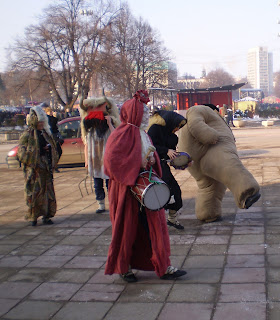Hot Wine and Kebapche served here
Above: More or less authentic Bulgarian 'kukeri' get ready for action
Above: Some "alternative" masquerading
Group from Palestine heads to the Mask Workshop
Group from the Basque Country almost makes it back to the hotel
Until today, I hadn’t been to the center of the western Bulgarian city of Pernik. I’ve always thought of it as a place you drive around on your way to Blagoevgrad from Sofia. After arriving in Bulgaria, the first thing I was told about the citizens of Pernik was that they are Bulgaria’s most obnoxious drivers (“beware of cars with “PK” license plates,” I was told). That was long before I learned that ‘pretsakvane’ – getting cut off or cheated out of what you think is rightfully yours, even if it’s a piece of the road) – is a national pastime here, so commonplace that if you take things (and yourself) too seriously, ‘shte poludeesh.’ Going crazy – another national pastime.
A positive example of 'poludyavane' is the carnival craziness in Pernik this weekend, as the city hosts the 20th edition of its justly-renowned Surva International Festival of Masquerade Games. According to Bulgarian traditions dating back to pagan times and still practiced today, ‘Survakari’ are those who on January 1 perform a special blessing to bring luck and health into each home, while “Kukeri” are unmarried men who masquerade through their towns on specific celebration days early in the year in order to ward off evil spirits. This description from the festival website captures some of the flavor of the ‘kuker’ rituals:
The dance of the masked men [‘kukeri’] is a mystic unity of rhythm, sound, and color. They move in a special step. Wearing impressive masks and unique costumes they fill the air of the villages with the sounds of hundreds of bells and whispered blessings wishes for prosperity. The mask, according to folklore beliefs, protects from the harmful influence of impure powers.So this afternoon I braved the cold and joined the crowd in the Pernik city square, where masquerading groups of from all over Bulgaria and abroad (I personally witnessed groups from Slovenia, Palestine, and Basque) offered an amazing array of inspired interpretations – from authentic regional folkiness to contemporary creative craziness – of the ‘kuker’ and related folk traditions. In their broad inclusiveness, the membership of most groups reflected the festival’s laudably liberal policy on this point: “the minimum requirement for participation is having the willingness to take part.” As the groups paraded – jumping, dancing, resting a bit, jumping some more – toward the competition stage, they created a chaotic carnival in sound: a sustained clanging cacophony of not hundreds, but thousands of metal bells. This was duende-infused craziness to be sure.











Geoff, did you generally feel safe amidst the "craziness," or was there some sense that danger might break out at any moment? How would you characterize the emotional state of most of the participants?
ReplyDeleteI can't get past the feeling that you use "craziness" in a metaphorical sense. How sincerely, for example, do you think the people are in donning costumes and dancing "for good luck"? Do they really believe that participating is going to make any difference? Or is it just a way to "pass the time" and maybe get something to eat or meet someone and get laid, or both?
I was surprised to find no responding comment from me here, because I well remember writing one. I will paraphrase it now.
ReplyDeleteNo danger at all, unless you count the possibility of catching a cold from staying out too long in near-freezing temperatures. The event is highly organized and involves groups of kukers who have come to Pernik to represent their various towns and villages. Competing at the festival (for best costumes, choreography, etc) is the realization of a long-term goal for these groups and, while it may not literally be about bringing good luck or healthy crops anymore, it is certainly about developing good community spirit. This is not a Venetian or Brazilian kind of carnival at all, but has some similarities to the jazz parades in New Orleans.
Thanks! I'm sorry that something happened with the posting of your first comment and that you had to redo your reply. Sounds a bit like county fairs in the United States (perhaps; I've only been to a few).
ReplyDelete